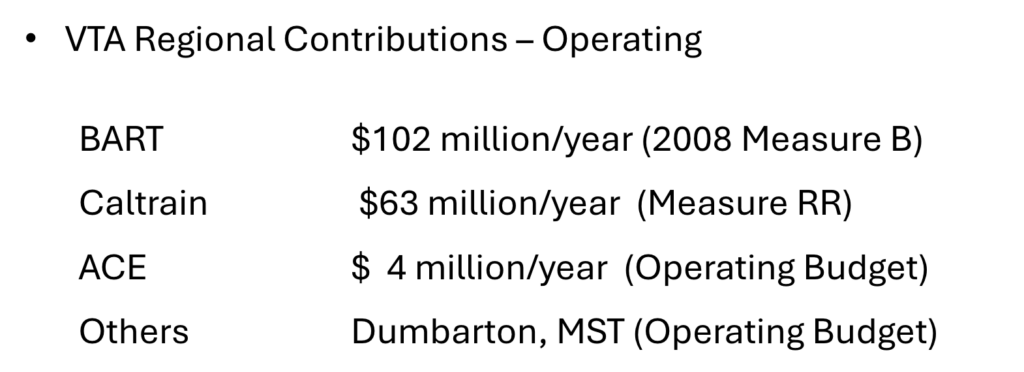In board meetings on Wednesday and Thursday this past week, the SamTrans and Caltrain boards acknowledged progress in amendments and negotiations on SB1031, the authorizing legislation for a regional transportation funding measure. The boards retained their positions to oppose the legislation unless amended, with the rationale that this would provide the greatest amount of negotiating leverage with legislators.
Caltrain wanted greater clarification about the decision process to fund Caltrain operations, since Caltrain’s deficit is expected to go up after temporary sources run out, but Caltrain’s operating budget has uncertainties because it hasn’t yet started running electric service.
SamTrans wanted to protect its ability to reauthorize its local sales taxes, including San Mateo County Measure A which was last reauthorized in 2004 and continues through 2033, and San Mateo County Measure W which was approved in 2018 and continues through 2048.
Both agencies wanted further refinements to the language about a consolidation study, which has already been amended to include more options about sharing services along the lines of SamTrans providing back-office services to Caltrain.
Later on Thursday evening the VTA board voted to switch its position from “oppose unless amended” to full opposition.
The main issues of concern to VTA were “return to source” – wanting more funds raised to directly provide funding for Santa Clara County, and concern about reauthorizing its sales taxes, including Measure A which was passed in 2000 and continues through 2036. Staff stated, and board members echoed that they would continue to negotiate.
We hear through reliable sources that legislative negotiations are continuing.
Meanwhile, VTA is seeking $6B in federal funding for BART Silicon Valley, while acknowledging that the operating plan the project depends on relies on obsolete assumptions about the pace of BART fare recovery. In order to justify the project, VTA obviously depends on the BART system continuing to run past Milpitas.
We wonder whether reorganizing VTA’s contribution to BART operations could help with the negotiations.
We also wonder whether reluctance to support regional self-help to keep the regional services running could add risk to getting the federal and state funding needed for the region’s top capital projects, including BART-Silicon Valley and the Caltrain Downtown Extension/Portal project.
Times have changed – Regional self-help is essential
At the VTA board meeting, the staff report showed VTA’s existing contributions to Caltrain and BART as reasons that it does not need to participate in this regional effort to support the regional services. But times have changed since the earlier commitments.
In the wake of the pandemic, Caltrain and BART, the regional services serving Santa Clara and San Mateo Counties have been recovering ridership gradually, and need funding to maintain service to continue the recovery.
Some leaders in San Mateo County have questioned the need to support BART – which accounts for two thirds of regional transit trips starting in the county.
In 2023, the state stepped in with stopgap funding to keep the regional services running. There are signs that the governor may attempt to claw back some of this funding. But the state legislature, heavily weighted toward Southern California, seems unlikely to come forward with new funding – and may even be reluctant to preserve the current funding – if the Bay Area cannot find a path to regional self-help going forward.

